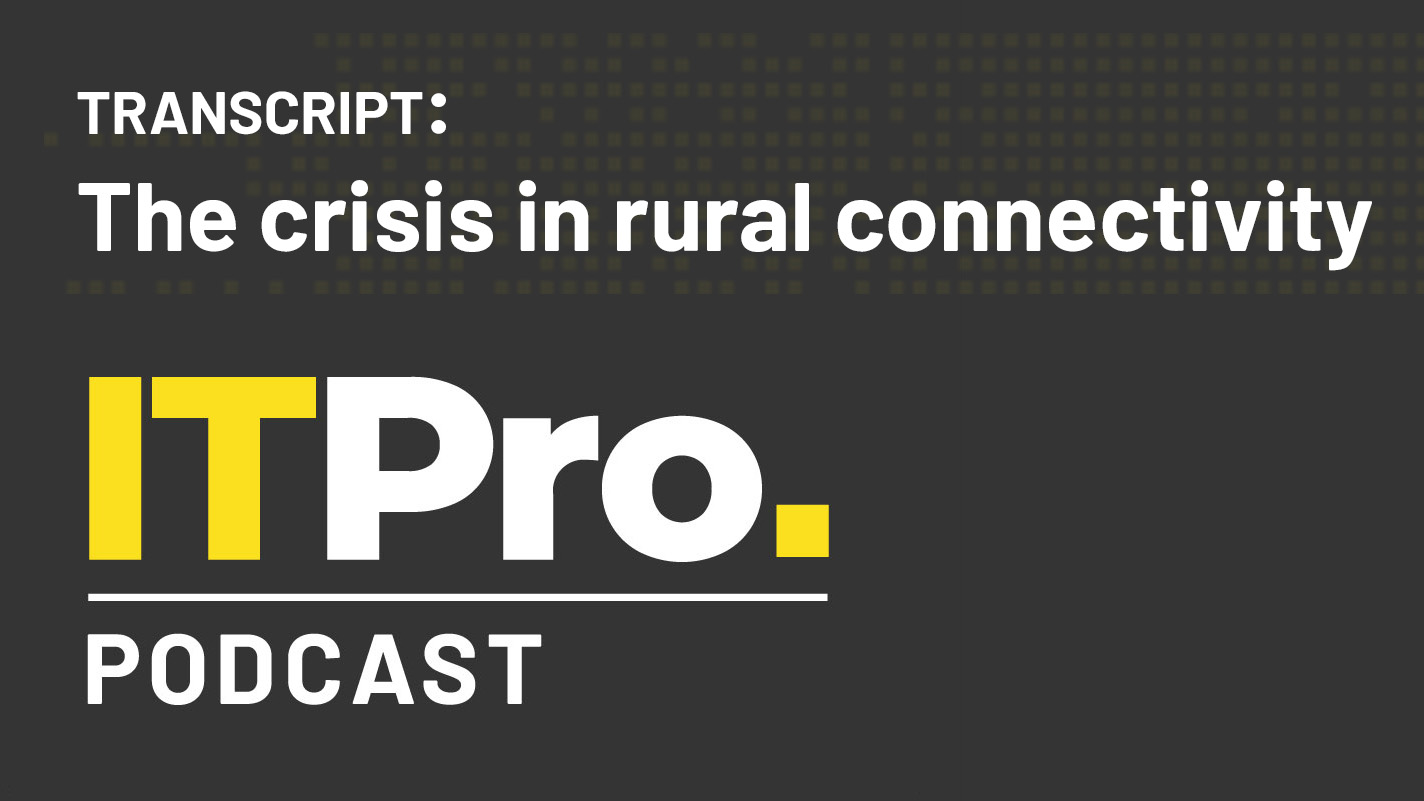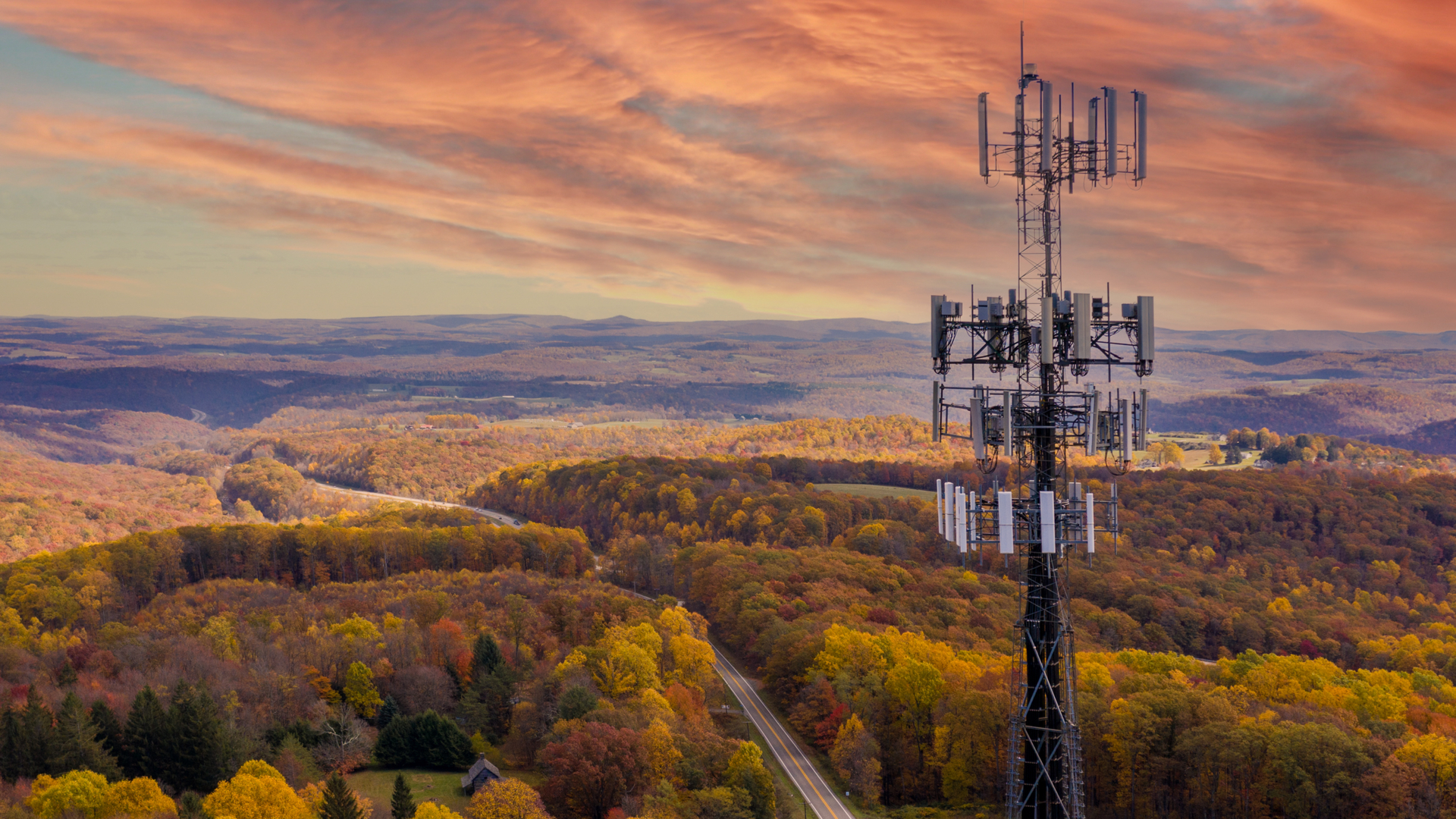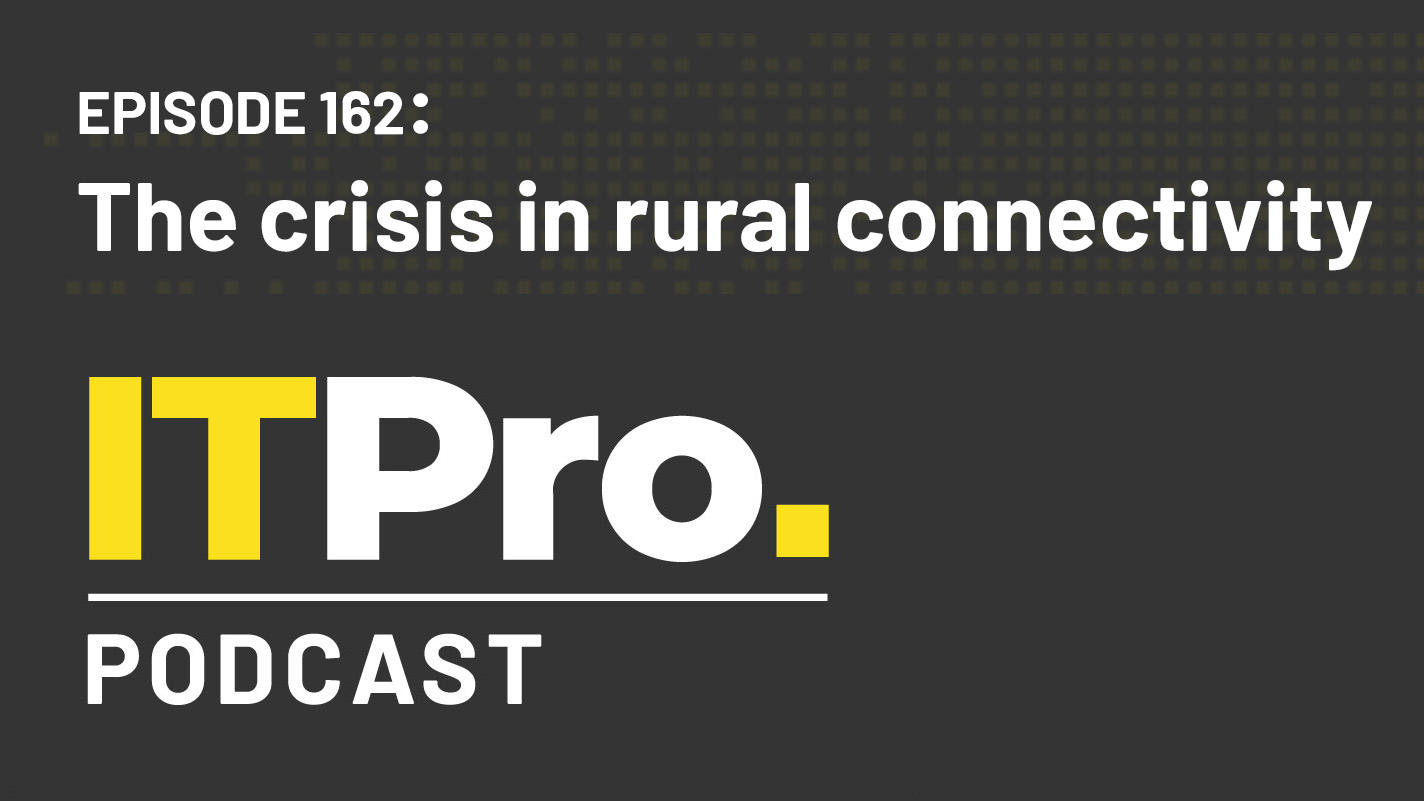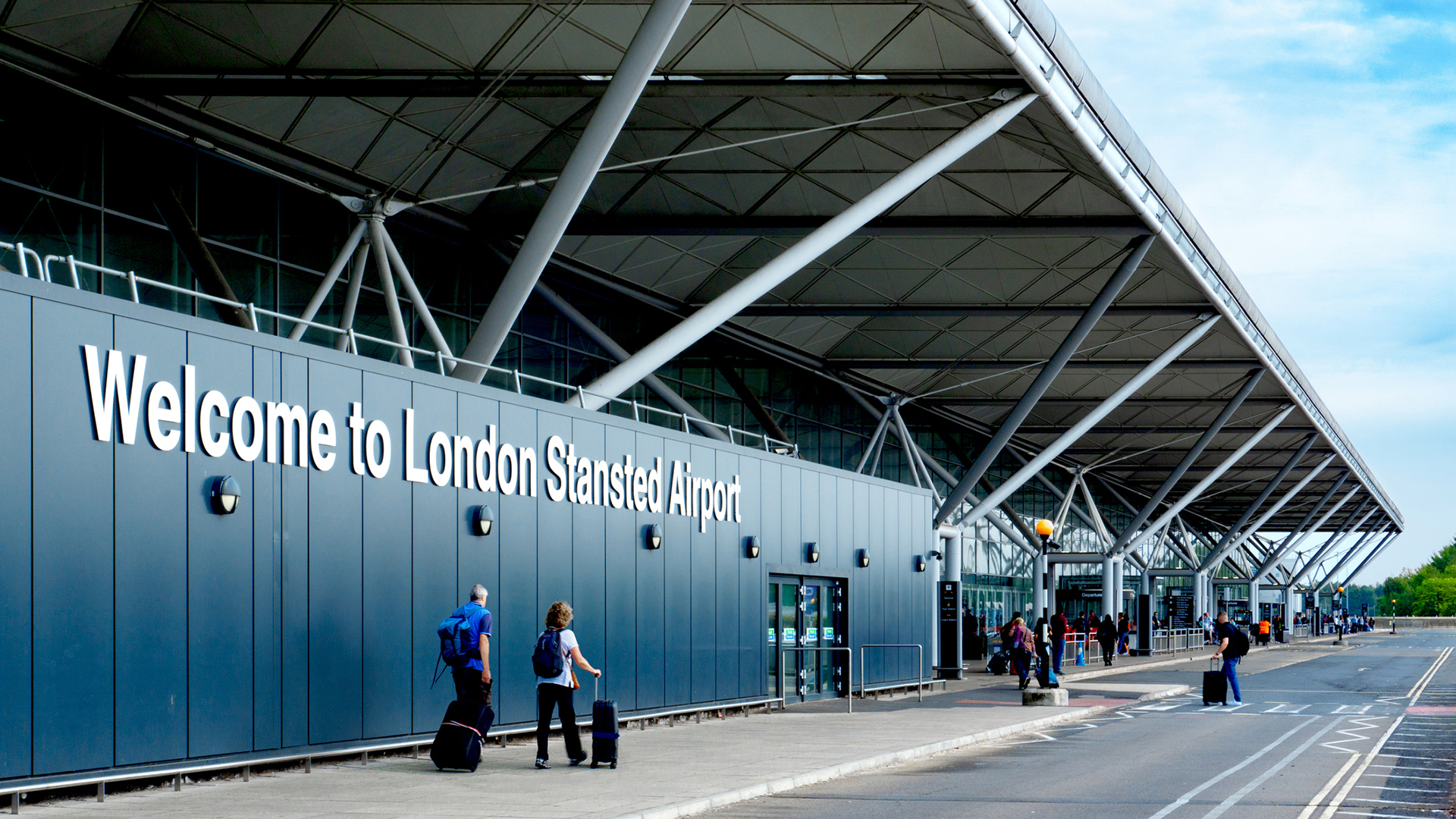Podcast transcript: The crisis in rural connectivity
Read the full transcript for this episode of the IT Pro Podcast

This automatically-generated transcript is taken from the IT Pro Podcast episode ‘The crisis in rural connectivity'. We apologise for any errors.
Rory Bathgate
Hi, I'm Rory Bathgate.
Jane McCallion
And I'm Jane McCallion.
Rory
And you're listening to the IT Pro Podcast, where today we're discussing rural connectivity.
Jane
The conversation around UK connectivity is often centred around the rollout of 5G, or the race for widespread gigabit broadband. But for many rural communities, basic connectivity such as reliable cellular service is still lacking, limiting the successful operation of rural businesses and continuing the already present divide between business in and out of the UK’s big cities.
Rory
In areas like Dorset, private groups have taken measures into their own hands to ensure they receive the connectivity they need in the region. Today, we're speaking to Dave Happy, collaboration lead at 5GRuralDorset, to discuss the connection difficulties facing rural businesses, and what is being done to help.
Dave Happy
Thank you very much indeed. Well I have to say this, of all the things I've done in my 37 years in telecoms, is the one closest to my heart. Thank you for having me.
Get the ITPro daily newsletter
Sign up today and you will receive a free copy of our Future Focus 2025 report - the leading guidance on AI, cybersecurity and other IT challenges as per 700+ senior executives
Jane
Thank you very much for joining us. So first off, can you tell us a little bit more about 5g rural Dorset?
Dave
Yeah, I'll give you a short pen portrait. It was part of the original department of Digital Culture, Media and Sport's, 5G testbeds and trials programme. It was originally envisioned as a programme that was only going to be of around value 5 million I think. During the course of the two and a half years or thereabouts that it ran, with an extension, it doubled in value. The partners included all kinds of people from Dorset Council who led it, I have to say, excellently to a large bunch of smees from all over the United Kingdom. There was academic input from Strathclyde University up in Scotland, one of the largest industry participants came from Wales. Rural is a big problem. And to think that Dorset could be at the forefront of leading a programme like this to help rural was something I'm immensely proud of. And although that piece, the formal piece has now come to an end, I think that the legacy speaks for itself. And there's now a formal mapping programme, which we can also discuss, and how that fits in with the programme later on in the podcast.
Jane
Yeah, it's really interesting, you say about how big the rural community is in the UK. We're often as you said in the introduction, whenever we're talking about connectivity we're talking about London, classically and Manchester, Liverpool, and so on. But a very high percentage of the UK is not a metropolitan area, it's small towns, it's hamlets, it's villages. And there are there are people living in those areas who would like to connect to the internet, in fact.
Dave
Yeah, and I have to say that not only do I strongly agree with you, I think it's long overdue or well past the point where we need to be gripping this problem as a nation. You know, having worked as a vice president in Samsung for a while, one of the things that I picked up in career was the great word 'pali-pali': 'now, now'. I cannot understand after 37 years why we still even have a digital divide, let alone on a scale which with the withdrawal of 2G, 3G, and copper switch off is actually going to be exacerbated, not improved. Now, however you look at that it's unacceptable. I've been told in the past never to use the word digital apartheid, which is now precisely why I do so. Because to me, this is a form of discrimination against those that happen to have grown up in a rural area, or those who are elderly and happen to live in such a rural area for whatever reason. Or a farmer who happens to be clearly by nature of his or her profession, in the middle of a rural area. And why should they have any poorer quality of service, not be able to place an order for their items on Amazon, not be able to download Netflix. But more importantly, interface with their surgery, get help from the council, try to interact with a bank to find out what their credit should be on, for example, an electricity bill not that many of us are worried about this stuff. But we really are. This is the reality of life in a rural community, and it frankly is unacceptable. We need to be gripping this, and to the extent that 5G RuralDorset has been able to play a part in fixing that problem, which incidentally it was never designed to fix, it's absolutely brilliant that this stays on the agenda. And we need to make damn sure it stays there until it's fixed.
Jane
And not to mention all these case studies of how the IoT can be used in farming, which are all great. We have, we'll have to put it in the related links in the show notes, a case study involving connected cows. But you know, you hear more about sort of combines and other law large machines on farms that in theory could be connected. But if there's no signal, then you might as well not bother, because they're certainly not going to drive themselves.
Dave
I mean, this is one of the weird things okay? Clearly, if you're setting this up and you only live in Westminster, and you've never heard of a famous place in Dorset called un Iwerne Minster... Iwerne Minster is not Westminster. These are different worlds, the solutions and the remedies that one might apply as a regulator or as a policymaker that might fit well in Victoria Street or outside Westminster Abbey do not uniformly apply in areas that don't have even basic service. And one of the things that we need to do is to make sure, as I said earlier, that we're not disadvantaging whole swathes of our population, young and old, who just happen to have the misfortune to live somewhere that doesn't have good connectivity and therefore can't even benefit from all the new stuff that we've been dreaming up. And I'll give you one thought. One of the things that we were doing appeared to be an unrelated project. And if you think back into the history of how our industry worked one of the biggest successes on the mobile networks, as I'm sure you may not know because your're both far too young, was SMS, Short Message Service. Now, this was not something that network operators foresaw as a major growth. And yet it was, and it was because it met a specific need. Well, now we have another specific need. And let me outline to you one of those examples. On what appeared to be an unrelated programme, we were looking at how we might improve grain production. We were looking at this partly as a result of the situation in the Ukraine, which as some of you may know was the world's second largest grain producer, until recent events, obviously made that impossible. So how can we still use less but generate more? Well, I'd actually go as far as to say I think we're in the middle of a second agrarian revolution right now, through agri tech that people just haven't woken up to, because they're all too busy telling me about industry, 4.0. I'm really tired of this. Right, what we did was we started using very high frequency radio. And for those of you that know anything about physics, and again I'll keep this really simple so as not to bore you. If a signal can only travel a short distance, we typically call it a high frequency signal and to that high frequency signal you can attach a lot of megabits or gigabits, whatever you want to call it to. So the lesson that I want to give you is if you're going to go for higher-frequency spectrum, it might only travel a few hundred metres but you might be able to carry gigabits worth of data over it. Now think about this. Everybody thinks of these applications in terms of small cells in a city, right? Oh there's lots of people in Oxford Street, they're all using tonnes of stuff, because they all want to watch Netflix while simultaneously being on eight teams calls and talking to their grandma in Bolivia. I mean, the reality is fine that's all true. But don't forget, through AI and analytics and smart technology I also want to use that in a rural area. What we did was we said, "Okay, what if we could use millimetre wave and connect it to an unmanned tractor using electricity? What's the advantage there? Why would we do it?". First of all, we had a system where we could use that tractor and we could scan a field for every single plant, we could then go back to a database and decide is that plant a weed? Or is it not not a weed, right? If we say "no, it's not a weed", we leave it. If it is a weed, we have an electric probe that comes along after on another tractor, electric of course, and zaps that weed. And what that does is it also puts nutrients back into the soil - let's not discuss the USA and dust bowls in the 30s, if you think it doesn't happen, it does. We have to look after our soil, we have to look after how all of this stuff is done. And all of a sudden, I've come up with a use for millimetre wave radio that requires a brand new chipset with high uplink capabilities. And all of a sudden, we were very much in the technical space that you guys and I inhabit. And yet nobody saw it coming, just like with SMS nobody saw the thread. And yet if I can find a way that could get fibre to the farm, this is a new acronym FTTF, note it note it well we'll be using it a lot. And guess how we might do that? We either direct bury the fibre like pioneering companies like Wessex internet for example in Dorset already do. And/or maybe we look at technology like fibre in water, because guess what? Farms have a need for irrigation. So if I need to get fibre closer to a farm, and I want to do the things that Jane was referring to earlier, including IoT, if I can get that basic connectivity there, I can use doubling grain production to do that because I've now managed to do that and not had to use pesticides on the field. I haven't had to buy so many of those nasty chemicals that I need to actually enrich the soil, which I can't afford anyway because they've gone up by 650%. Happy days. Now tell me, as I erect that mast on the side of the farm building, or on another small tower. If I erect a mast strong enough for double loading, in other words I can put two sets of kit on it. And that means that I can see either another local farm, the local school, an old folks home, whatever it might be that is a way forward. And all of a sudden, instead of just doing a research programme that was looking at a theory of stuff and what might be, we've come up with something about what is. And and we've come up with a way that we could begin to address that. And we've looked at a whole new design for chipsets with massive uplink instead of downlink capability. That's game changing. Welcome to Dorset, Dorset does, just don't think we're all asleep down here because we're not.
Rory
So when you're talking about some of these exciting applications, I know you mentioned direct burial there, you mentioned Wessex internet. As it stands, is this a case of cannot or will not on the part of the network operators?
Dave
I think it's a case of economics, I would say cannot. If it is a case that we've structured a market, and we have a regulatory environment which clearly incensed them to build where they can get the best bang for their buck, then I would contend that it's a statutory duty on their board members to do that. And therefore, there's no magic panacea here. There's two ways to fix this problem in a real way, they're either the costs come down to deploy the network, or the revenues go up from the network, or some combination of both. Now, if you want to make the costs come down, and the operator cost base is too high, one of the options is to empower new private networks perhaps. And guess what? The fastest growth in the UK is in private networks. If you want to empower that you need to do innovative stuff with spectrum. I mentioned Ofcom earlier, and credit to Ofcom for coming up with the design of millimetre wave spectrum supply that will enable those rural areas to start utilising those tractors, and not having to pay money they don't have for a service they can't afford, provided by a third party that doesn't really understand the rural need in the same way because it doesn't have a footprint there. And if you think that SRN is going to fix it, that's the shared rural network, I would contend again. Dream on. That's another problem we can come to in a minute. So let me come back to your question and your hypothesis there. I don't blame the companies concerned, whether they're fixed or mobile, for not doing that that doesn't get them a return on capital. Where I struggle is not having found an effective way, and seeing over decades repeated announcements about how it's all going to be closed and everything's going to be fine. Well, yeah, but where I'm sitting right now it isn't. And not only that, the stats bear it out. So let's just have a small reality check, and let's think calmly and constructively between all of us how we can fix it. And I think one of the things that you want to do is push and pull a problem at the same time. If operators that exist don't want to do it, either let little guys that can do it more cheaply and or give them additional revenues. And if you can't do that, which you can't because we don't have the income in a rural communities, then there's a role for central government in helping that to happen. BT UK, for example, has been useful in doing this kind of stuff. They've done innovative stuff in Cornwall, and some stuff going on in Dorset I'm aware of at the moment. But we have to just do more. And we have to do better, because it's not acceptable to have a digital divide this century. I'm sorry, it just isn't.
Jane
Yeah, I was gonna ask actually about sort of what the role of the government is. Whether that's local or national government, for example there is a very small village, it's a hamlet really that I know in France. And when I first visited there was no connectivity, we didn't even have a television. Now they've got faster broadband, certainly faster broadband than you will find where my parents are in Wiltshire. And is there a possibility that that's what we need to do here? And if that is what we want to do, is it going to happen?
Dave
Okay, is it what we want to do? To a degree, yes. Is it going to happen? No. That would be my... I believe in straight answers to straight questions. However, I can give you a more positive steer at the end of it because I do see a third way. I remember France, I also used to live in France many years ago. And I remember Minitel. I also remember having lived in Germany, the development of early ISDN, ISDN2. There is a point where it's the right time to do something, and I think in the UK it's fair to say we've left it a bit late. We are no longer major manufacturers. Our problems have been in my view, partly a failure to release spectrum more quickly, although I understand why Ofcom is cautious. I therefore challenge the orthodoxy that underpins spectrum pricing as no longer being fit for purpose. That's one. For fibre I say like I said before, if we can find ways to either reduce the cost of deployment or look at ways that we can enhance the revenue, and to do that everyone's always gone for let's enhance the revenue and stackable use cases. Well, if they're making the kit of course they'd say that. If they're an operator, of course they'd say that it's very, very difficult to do that. If you're struggling with finances, and you're on an income of maybe 17 and a half, £18,000 a year you don't know what the future of the Common Agricultural Policy that's now defunct, who's going to pay for what to keep you in business and keep you alive. And the average age of a farmer is considerably older than the national average and other professions. So we should be doing more to help our farms, we should be doing more to help our rural communities. I think Defra, as one of the departments that isn't going to be merged into something new, I hope shortly, have an interest in this. And I know I've spoken to the NFU on a couple of occasions whom I write most highly. So I'd like to see the continued growth of for example, more true independent neutral network hosts. Now, typically if you talk to a mobile network a neutral network host is, oh, it's one of us four. Well no, it doesn't necessarily need to be that at all. And not only that, in the new world all I really want for connectivity is an Ethernet port. I'm not even sure I need switch connectivity in the way I used to need it. So guys, if you don't come along and provide it and make that investment, I'm gonna go to someone else that can. So what I'd like to see is that fibre rolled out, for example why shouldn't every village in Dorset or indeed every rural community have fibre to the local village hall? Why should we not have free Wi-Fi 6 hanging off the end of there? Is this beyond the wit of man or woman? No, it isn't. The handsets to do this, this kind of tech, how many frequencies have you got in a handset? Probably in excess of eleven these days, you can link to satellite, you can link to multiple Wi-Fi bands, you can link to multiple cellular bands, you can make sure you don't get lost on your way to work but hurry up in case they switch the satellites off. There's all kinds of stuff you can do. And to say that we can't do it or we shouldn't do it isn't good enough. What we have to do therefore I think as a country is to look more at the standards angle here. Because what we're suffering from is a downstream problem. If we're not making stuff, and we're not spotting where the the opportunities are, and therefore what's in the standards isn't in these devices that means people can't use them quickly and cheaply. Now, if I'm doing stuff like agricultural robotics on funky new chipsets on farms, using a frequency band that you can now get in a form factor, meaning the size of your phone okay? Then surely that's an intelligent way to proceed. And if we could continue to spot technologies, for example, you wouldn't back WiMAX would you, let's back Wi Fi. We need to be looking at the standards, we need to look at the spectrum and the third 's' that I will add to that is security. Because it doesn't matter whether you're in an urban or rural area, if it isn't insecure and you can't trust it, you're not going to use it. So I think an intelligent combination of that as a way forward, combined with making it easier for smaller companies to get radio spectrum and to deploy fibre, having that all most importantly of all intelligently mapped on a platform that enables alternative network companies to swap their capacity or just to swap their assets, is a really smart move. Oh, guess what? Fibre in rural Dorset, mapping it all, doing this is exactly what one of the outputs of the Dorset project is and I believe just signed up to by a company called Wildanet in Cornwall this very morning
Jane
I mean, the name of the organisation is 5G RuralDorset and I'd actually quite like to talk for a moment, we've been speaking about fibre. As I understand it, once again listener back to my days when I was living in the countryside. We had no mobile signal when I was living between Shaftesbury and and Salisbury.
Dave
Oh, difficult terrain.
Jane
As I understand it, part of the problem yeah is the geography. Listeners cannot see this, but Dave is making hill signs. You just cannot get the signal to work with the geography and actually mobile broadband, which has worked super well in places like Africa where it is much flatter, doesn't work here because millimetre wave can't even make its way through concrete sometimes. Let alone a big old chalk down. What do we do, is mobile broadband, mobile internet, do we just forget about this in a rural context?
Dave
Okay, no, I don't think we forget about it. And also for those of you listening to this in the future, I'd like you to think about something that you might find interesting to conjure up a mental image of the terrain we're talking about here. For those of you old enough to remember the Hovis adverts on the television. There's a wonderful street which people wander up. It's a really steep street, it's got buildings on either side, it appears to have been a real life cut out from the mid-19th century. That's Shaftsbury. For those of you in Yorkshire, I apologise but that's ours, we own it. Back off. Now, on that note however, we have a lot in common with our friends in North Yorkshire and the moors in terms of difficulty of the terrain and economics of this. My contention will be is that we need to have a more open minded approach to this. I don't see mobile necessarily as part of the solution, I see it perhaps as part of a problem. The spectrum holdings of the mobile networks are actually in the lower frequency bands. But the demands are coming increasingly for greater capacities to these devices, which in turn, these mobile devices are going to require ever higher frequencies. Now that's going to cause a real problem. That's why stuff like network densification is important, but I'm not interested in what we're doing in Oxford Street because I don't live in Oxford Street. I live on that street in Shaftesbury, and I can't get a signal across to Salisbury because the terrain is difficult. And I haven't got any base stations, we don't dream about or have problems with whether or not we have overbuilding in rural areas, we have a far simpler problem. It's called 'any build'. And in order to make this work, the only way to do something which actually meets two needs both coverage and capacity, I see the two as two sides of the same coin. It's just not acceptable to have just coverage and no capacity, because then all you're doing is you're rationing food between people that are all hungry, that's wrong, you shouldn't be thinking that way. What you should be thinking of is how do we get that big capacity utilised? If the laws of physics are telling us anything, they're telling us that what we need to do is get fibre deployed as far and as deep into these places as possible. And if that means I can do it at 30 or 40 quid a metre by simply direct burying it, or not subducting it but getting something in there, that's more sensible to me. Yes I know, in the States and other places you can string it between poles. I'm talking to you from a rural area right now where it is fibre to the pole, and it is hanging off, and it does break down in the wind. But it's still sure as hell a lot better than the alternative. So I don't see mobile as a solution, because I don't don't see the spectrium holding as relevant to the capacity needs that Shaftesbury and Salisbury still have. I don't see it as a way of serving the rural spots in between, because wherever there's a farm I want to break out from that fibre and enable my millimetre wave robots and all the IoT and other devices, as well as let the children on the farm do their homework and watch Netflix, and all the other things that normal people do in the real world. And I don't want discrimination to exist in any place. And therefore I say we have to get fibre in, we have to do a deeper and Jane, I think asset mapping is the key here. And that's the thing that could unlock it, and is well worth discussing further because I think it's something that everybody else misses.
Rory
I mean, we've talked to him about some of the solutions here. And I know this is something we touched on earlier. But I was wondering if you could expand for our listeners some of the biggest challenges for businesses associated with with poor connectivity in rural areas, and maybe what the impact on the local economy is as it stands,
Dave
Oh, it's major. If you're in a business and you can't even get a basic Teams call set up, it's just unbelievable. I'll give you an example, I was actually driving across Dorset less than 48 hours ago. I was trying to be on a Teams call at the same time, it dropped out on at least three occasions. This was in a 20 minute period for what should have been an hour call. In the end, I had to drop out completely. I have as yet no clue what the conclusion of that business deal was, or whether or not we were even able to transact any business. And therefore to the second part of your question Rory, what impact does this have? Well governments and others measure, local government as well, measure on gross value added GVA. What what is it that we're losing out on, in effect, in our areas as a result of not having that connectivity? Well, I can put a value on that business deal. I can also put a value on something far less pleasant, and I'll tell you this because it's a true story. One of my neighbours recently died, God rest her soul. And she would have been in her mid 80s. I'm in the middle of nowhere, I'm in the lee of the hill, the coverage is appalling and I've got trees around me. And we're it not for the fact that I've complained bitterly and ended up getting fibre to the pole, and I no longer have a problem within my house, this was not the case when fate overtook her. And what happened was the ambulance showed up, they were trying to communicate with the local hospital which is 25 minutes away. Forget your eight minutes ambulance targets because we've already died if you live in a rural area. Another good reason for improving rural connectivity, because there's an NHS set of cases around this. The reason that she died was at least in part because they were unable to communicate and get ECG information about her heart rhythms and quality to a consultant, who was available at the other end of a line had they been able to get a signal through. She died. Now, for me that's deeply distressing and personal. We talk about this in some kind of esoteric way, like nothing actually is real or it doesn't matter, or it's okay to have a divide. It's not okay to have apartheid, it's not okay to have people die, it's not okay for children not to be able to do their homework. It's not okay for a farmer not to be able to do his or her job properly. It's not satisfactory, this is not the Stone Age it's a techno age, we need to do far better. So in terms of GVA, I think the stats if anything are depressed. I think that the real loss to the rural economy is far more significant than we can report, because one has to remember these are simply economic indices of measurement. And we don't know exactly what line items they put into it, because I bet they didn't put my neighbour who died into it. I bet they didn't put what would the cost of a lifetime value of a life have been if that lady or gentleman had been in their 30s, and the tax income and all of those things. If you want to do that, that's the terrible, sordid, and unpleasant work that people do when they're looking at actuaries, and insurance benefits and payouts. But only part of that is, as I understand it, done for GVA. So the loss to the rural economy of not having this fibre in place is infinitely greater and far more personal than people really understand. We need to do better and when I say it, when I told you I meant it from the heart, now you know I do.
Jane
Yeah, and there's also presumably a brain drain issue as well. Younger people move away because the jobs are in the larger towns in the cities. You may not even be in the county they grew up in but yeah, so if I wanted to found a business in we're gonna give listeners we're gonna give you a tour of the rural South West. But if I wanted to found a business just outside Wilton, which is also near Salisbury, I can't help but think that there would be limited impetus for me to do that rather than move to Southampton. And do it there where I know that I can get the support from a tech point of view, from a business point of view. And when it comes to the digital divide and levelling up and all that, this is the reality of the problem with connectivity.
Dave
In terms of location, your point about Wilton, Wilton is also not Westminster. And if you're trying to operate a business and you know that you must have solid, reliable connectivity you know that you're not going to get it when you're moving about around from Wilton, because I know the terrain fairly well. Between Wilton and Shaftesbury, and that whole area, is equally hilly, the coverage is equally lousy. So if you start a meeting, find that you have to go out to do something else, you don't have the flexibility you would have done in an urban area just to do that because you can't, that ties you to your desk, that may mean you lose other things. These are real problems. So getting that fibre in, and I've mentioned Wessex internet I should stress other brands are available, the smaller altnets making these investments. If they begin to be able to link up their capabilities and capacity to extend their footprints and obiter dicta they're able to improve the radio coverage because more spectrum becomes available, and more open neutral network hosting becomes available where they can play a role in it too. That would be great. If the MNOs are able to do that quicker then that would be great. But just for God's sake, get something in that takes away this location dependency because, as you rightly point out Jane, the inevitable conclusion of this is it sucks people into more urban areas where there's already pollution, congestion, and all the problems that go with being in that environment. But we have a circular economy, the urban areas can't function without the food that the rural areas provide, the rural areas can't function without some degree of dialogue with the urban areas and would want it to be so. And then you might get a pandemic, where everyone in the urban area wants to come and rush out to a rural area. And then find they can't because there's no connectivity, I'm just saying. So point one location, it matters, your point is well made and it needs to get sorted because we will not be able to encourage people to look at this in a broader context and move to outside and actually have a living in a super area. And let's face it, who wouldn't want to live near Durdle Door and have the quality of life that goes with that if they could also have the salary that they would have got if they'd have stayed in Dulwich? Now, your second point was skills. I had for two and a bit years a young lady working for me who was a postgrad at Exeter University. She was a Dorset resident and absolutely brilliant, studying the geographies of 5G. During the programme, we went back to DCMS and said "could you change the rules on collaboration to make it more inclusive?" Again, discrimination is a big thing of mine. It really is important that we stop this nonsense and to encourage, in particular, people from rural communities. In particular, women from rural communities in an industry which is full of middle-aged middle-class people that look and sound depressingly like me I'm afraid. It's not good enough. And I hold my hands up, okay, mea culpa. So I did something about it, we acted as mentor for the young lady concerned who has now been recognised as one of the top 100 people to watch in the field. Recognised, she's got multiple awards, she's met the former minister I forget they changed so often these days, don't they? Also, she was interviewed on Connected Britain, she's just really all alert and about herself and able to give us information and insights about how we could improve skills that would help her to stay in her home county of Dorset. Because she's from the Bridport & Lyme Regis area. Exeter is her local university. If we could develop an ecosystem technical hub, which we're currently working on in the area of Winfrith, for those of you that know Dorset Innovation Park. One of the things we're looking at, we don't know yet if we can make it happen, is a Skills Development and Training Centre for fibre and water. We will be putting in a bid in the near future to someone from a government body or regulator that might be able to assist in that regard. So what we see is the chance to develop pockets of excellence, and try and build all that expertise in a given area. It might be fanciful, but one thing I do know is that if you don't try and if you don't take individual and personal responsibility for mentoring somebody younger than you in a rural area, and you then try to give them better prospects, then you failed. And that in actual fact, the thing that you don't measure by gross value added benefits realisation on the DCMS programme, is whether or not you've been able to change young lives in a positive way. One of that young lady's colleagues is now working for a company of which I'm on the board. That would not have happened, but for the 5G RuralDorset programme. And at the moment, we've been able to keep her working from home in Cornwall. Am I proud of that? You betcha.
Rory
Something I wanted to circle back to that you mentioned earlier, is this idea of the sunset for 3G and for 2G. I know we discussed this briefly at an event recently, but take 2G. Ofcom has set a target of 2033 for when all 2G services will be completely deactivated in the UK, if not before then. Between now and then, at the moment, does it feel like the necessary steps will be made so that rural communities don't feel its absence?
Dave
May I be cheeky and broaden the question to include 3G sir?
Rory
Absolutely.
Dave
Oh, thank you. That's very sporting because now I can give a slightly different answer. Okay so what have we actually seen, and let's link it also into copper switch off as well. Because if you live in a rural community, it is not impossible these days that you might be served by some kind of radio solution. Or you might even be dependent on your 2G or 3G signal, because you haven't got any other reliable means of doing it. Because under the new regulations, if BT want or Openreach wants to decommission an old exchange, it doesn't have the same duty to serve all the people on the new exchange, that it's just fibred up that it previously did. And what that means is the people that are most likely to suffer are actually the remotest in location terms from that exchange. So in actual fact, that makes the problem worse not better, and more expensive to fix. So let's look at 2G first of all. 2G does give you that excellent coverage. Okay, the difficulty in terms of spectral efficiency is well known, it's not the most efficient. However, I don't think that they can turn it off easily because the quality of the rest of the infrastructure in a rural area simply won't permit it. Now, I haven't seen that actually stated in a press release by anybody anywhere. But that's the real truth behind it. So you can't switch 2G off because it's such an elementary baseline and there's nothing else if you did, it would be a disaster. However, 3G you might be able to say that you could, because it sort of fits as a stall in my mind between what 2G has and what 4G has always promised, and actually begun to deliver in a good way. So 3G is the one you could switch off, but in so doing you're still going to impact people most and forgive me, but the one thing that we have in common on all of this is that when you're touching 2G, 3G, or copper, you are hitting which areas? Is it a) urban or b) rural? Ah, I think we know the answer to this one, don't we ladies and gentlemen? So my take on it is 2G I think will be left on. We've already seen 3G, I've heard you were talking about 2033 on 2G, I've heard dates of 3G switch off taking place within 24 months. Now, it might well be that government can set all the targets in the world, and regulators can set targets, wonderful things targets. And sometimes they even get hit. I'm not saying they won't be, I'm not saying they will be, I'm simply saying if 3G is going to get switched off in two years and they can switch off 2G more quickly then they will. They're already switching off copper. So in a sense, as far as I'm concerned, in terms of trying to help a rural community, it's all part of the same thing. On the one hand, we're being told that we're all going to get gigabit capable connectivity. On the other hand, it's not happening fast enough. And I actually feel deep concern, and support, and pity for BT UK I think they're trying to do a cracking job. They really are trying to make a difference. And their approach to open access and stuff is really good. But on the one hand, they're doing great work and on the other hand, it almost feels like Ofcom's given them a kicking, because what we're doing by changing what areas are not covered by what and when it doesn't seem to me that it's quite joined up. I'll leave it at that, because I think there's good intent on all sides. And of course, things will always evolve but my sympathies in this particular discussion will go to BT UK over Ofcom as to how legacy spectrum has been refarmed. Do I think it's necessary? Yes. Is it of limited supply? Well, we can debate that till the cows come home, literally, unless of course we begin to look at things like CBRS and expansion of spectrum sharing. Interfering with military capability. No, thank you, Dorset's largest employer is the military. You can't have something that might damage capability. But what you could do is look at improved sharing within existing bands that are there. And the big problem that rural areas have, if you go for a licence that you don't have to go to a mobile network to beg for because in reality, that is a form of licence called licence shared access, begging perhaps a strong word, but it is at their discretion, and rightly so because they paid for it. However, if you go for spectral new rights to Ofcom in a licensed band that they don't hold, my big complaint has always been that process has been far too manual. It's had a lot of errors in it. And it hasn't been adjusted quickly enough to enable the growth of the private networks that would have helped the rural areas more, and would have got those Ethernet connections in and might have speeded up my doubling of grain production, helping the local farm and enabling my granny in a home to have a haptic hug because I can't give her a real one. And those things actually really matter.
Rory
Yeah, absolutely. I was wondering, as a kind of a final question. We're talking in 2023. What do you think this situation will be like in say, five years? In 2028? Better or worse, or about the same?
Dave
I'd love to tell you that I thought it would be better. I think it may be slightly better. To some of its to some of that depends on how much we as individuals, and in particular in rural areas are prepared to make enough of a noise about it. Because within two years, there'll be a general election that will lead to inevitable change, we have changed within government departments. Now, I don't think on the government side that there's a lack of interest in trying to fix the problem. It may be a lack of understanding, it could be a lack of money. It's certainly sometimes the case of not being able to easily join up policy silos. So for example, one department might want to get better fibre connectivity to remote location for capability reasons, a farming, Defra may have a need to get capability to farms for other reasons. Be the UK might just want to improve gigabit broadband services to everybody. But they're all working to their agendas in the way that they work to the budgets they have, because they need to have some command and control. But the thing about 5g is it no longer respects those boundaries. If we could get to, in five years time, a place where we haven't been in a rural community penalised by 2G, 3G and copper switch off in the way that we are today. If we could see the mobile network operators doing their absolute level best to fill in current capacity gaps, even if we haven't fixed all the coverage and capacity gaps getting it better than it is or far better than SRM is promising. That will be helpful. I don't expect them to fund it, they're not charities and therefore I'd like to see Ofcom make more spectrum available on the shared access licencing side with higher power levels that would enable me to transmit beyond the foot of my damned mast. Because at the moment, that's a problem if we do those things, and we continue to remove the barriers to deployment in rural areas, and I think again, credit to DCMS as well. is doing some great work with the barrier dusting type busting task force, then Rory, the answer is on balance just about slightly better, but not a radical change. I fear, I hope we can get the radical change.
Rory
Well, it's something we could talk about for ages. But unfortunately, we have time for for this episode. So thank you very much for being on the show.
Dave
You're welcome. Thanks very much indeed.
Jane
As always, you can find links to all of the topics we've spoken about today in the show notes and even more on our website at itpro.co.uk.
Rory
You can also follow us on social media, as well as subscribe to our daily newsletter. Don't forget to subscribe to the IT Pro Podcast wherever you find podcasts. And if you're enjoying the show, why not tell a friend or colleague about us?
Jane
We'll be back next week with more from the world of IT, but until then, goodbye.
ITPro is a global business technology website providing the latest news, analysis, and business insight for IT decision-makers. Whether it's cyber security, cloud computing, IT infrastructure, or business strategy, we aim to equip leaders with the data they need to make informed IT investments.
For regular updates delivered to your inbox and social feeds, be sure to sign up to our daily newsletter and follow on us LinkedIn and Twitter.
-
 Gov's broadband plans do little to address 'rural brain drain', expert warns
Gov's broadband plans do little to address 'rural brain drain', expert warnsNews Businesses are still unable to compete with urban counterparts, forcing job seekers into the cities and suppressing innovation
-
 The IT Pro Podcast: The crisis in rural connectivity
The IT Pro Podcast: The crisis in rural connectivityITPro Podcast Rural businesses are still being left behind and face shutdowns of 3G and copper without anything to fall back on
-
 UK government to run Starlink trials in Snowdonia, Lake District
UK government to run Starlink trials in Snowdonia, Lake DistrictNews The government has indicated low-Earth orbit satellites could be key to expanding connectivity to UK businesses
-
 Satellite broadband could turbocharge rural business connectivity
Satellite broadband could turbocharge rural business connectivityIn-depth The burgeoning industry is pledging to succeed where fibre has failed, in a much-needed push to connect chronically underserved businesses
-
 Podcast transcript: Can 5G close the digital divide?
Podcast transcript: Can 5G close the digital divide?IT Pro Podcast Read the full transcript for this episode of the IT Pro Podcast
-
 The IT Pro Podcast: Can 5G close the digital divide?
The IT Pro Podcast: Can 5G close the digital divide?IT Pro Podcast Connectivity is essential for modern life - but can 5G help bring it to those without?
-
 BT's 'SoHo' business aims to help SMBs rebuild post-pandemic
BT's 'SoHo' business aims to help SMBs rebuild post-pandemicNews The spin-off will offer broadband packages, free digital skills training and cyber security tools to SMBs and startups
-
 AT&T pledges $2 billion to help bridge the digital divide
AT&T pledges $2 billion to help bridge the digital divideNews Telecoms giant is working with the Emergency Broadband Benefit program


